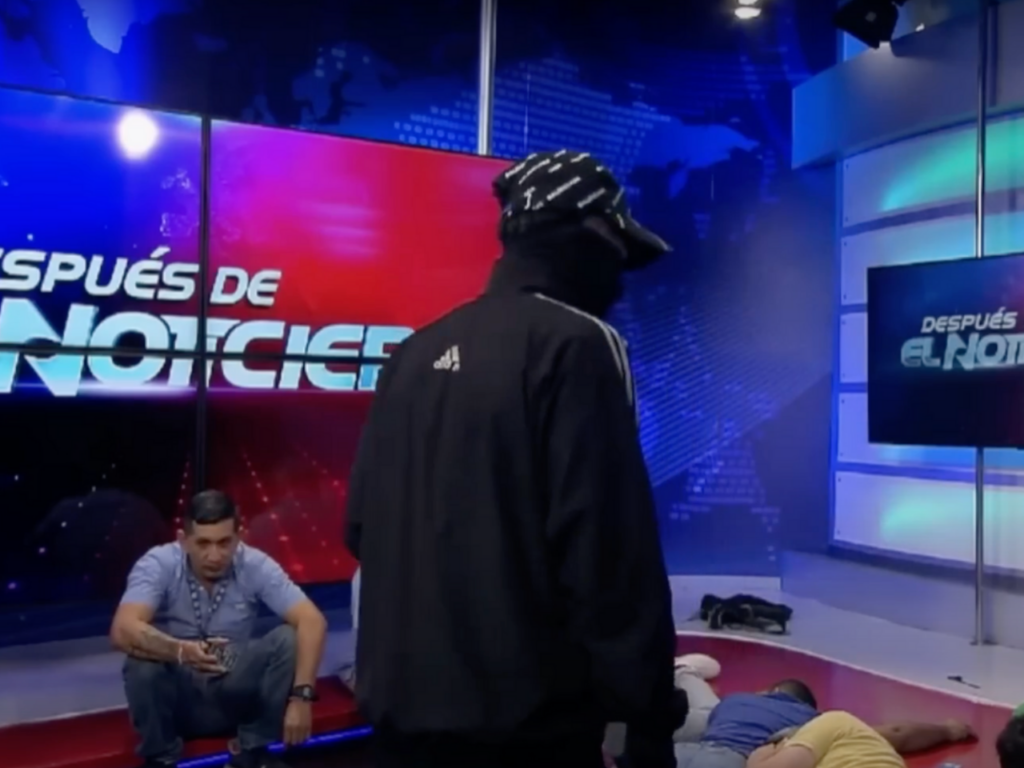Journalist’s nightmare in Guayaquil: from newsroom siege to an uncertain reality
With no warning, a forceful pull abruptly tore my blouse. As I stood there with the gunman’s arm wrapped around my neck and his weapon pressed against my head, they compelled me to walk. From a group of 10 or 12 people on the studio floor, we dwindled to six hostages, moving from the main studio to a smaller one at the back.
- 2 years ago
January 28, 2024

GUAYAQUIL, Ecuador — Recently, my routine as a journalist took a sudden turn. My workplace transformed into a battleground. On an ordinary Tuesday on January 9, 2023, armed assailants invaded the headquarters of the news channel I worked for, turning my day into a chilling struggle to survive.
Huddled in a bathroom with colleagues, terror became palpable as gunfire erupted just meters away. Urgently sending messages, we stepped into the spotlight, our trauma broadcast live. The crisis reached a climax when assailants selected hostages, and I became a pawn in a dangerous game unfolding on live television.
Liberated through police intervention, the return to work offered no solace. Broken doors and safety discussions couldn’t erase the lingering fear. The harsh reality hit home when news of the prosecutor investigating the attack’s murder surfaced. The return to work shattered the illusion of security, leaving me in constant uncertainty and genuine terror.
Read more crime & corruption stories at Orato World Media.
Journalists’ fear comes true: “They’ve invaded our channel; they’re going to kill us.”
I reside on the outskirts of Guayaquil, nestled in a gated community, where a sense of safety envelops us, shielding us from the escalating turmoil that engulfs the city.
When I navigate the highways, gripping the wheel tightly, tension spreads over my muscles. The rumble of a motorcycle engine sends shivers down my spine – a chilling reminder that, as a journalist covering police stories, hired killers prefer motorcycles as their mode of transportation. The fear of being caught in the crossfire of a shootout haunts me.
Recently, the president declared a state of siege following the escape of a drug trafficker and the atmosphere soured. A concerned colleague’s message echoed a warning: “Now mafias target journalists; let’s be cautious.” Initially brushing it off, I had heard such ominous words before.
On that Tuesday, I arrived at work, greeted by the frenetic pace of a news channel. Producers and journalists hustled from one task to another, preparing for the upcoming broadcast. Immersed in the writing room near the building’s entrance, I diligently reviewed the scripts for the next program.
Amidst this routine, a message in our team’s WhatsApp group abruptly seized my attention: “They’ve invaded our channel; they’re going to kill us.” Before comprehending the gravity of the situation, gunfire erupted, and the shattering could be heard just meters away.
A colleague urged me to follow him, but I chose a different path. Desperately searching for a hiding spot, I darted to a bathroom near the rear door. Fueled by instinct, my mind raced to evaluate the best action. As danger loomed closer, my fear intensified. I turned off the bathroom light and entered a stall, immersed in a sinister game of hide-and-seek.
Journalist takes shelter with two colleagues in a bathroom stall to evade imminent danger
Moments later, José Luis Calderón, an animator, and a new colleague joined me, all huddled together in the same cramped space. Agitated, I reached for my cell phone and began frantically sending messages to a friend, my children’s father, and the director of the journalistic organization I worked for. I implored them to inform the police that our lives were in imminent danger.
Somehow, muttering and whispering, I answered a call. Barely speaking, I urged the father of my children to contact the police. I struggled to explain the dangerous situation. Amidst sobs, the girl beside me pleaded for me to lower my phone, fearing it might give away our location.
Locked in that confined bathroom, sandwiched between two others, my mind conjured images of mass shootings in the United States. The fear of becoming victims of indiscriminate gunfire overwhelmed me. My uncontrollable trembling inadvertently caused the toilet I stood on to creak.
Suddenly, Whatsapp messages reached us – terrorists were heading to the bathroom. In less than a minute, we heard the attackers enter. José Luis grasped my wrists, repeatedly urging me to calm down. As the flick of a switch illuminated the room, I struggled to regulate my breathing as my body betrayed me.
Trying to keep my composure, I sensed their advancing steps, closing in on us. With relentless pounding on the doors, they eventually uncovered our hiding spot. To my surprise, they did not fire any shots. Instead, a barrage of insults and shouts coerced us to emerge. In shock, I stood frozen, and then one of them yanked me forward by my hair.
I noticed one of the assailants engaged in a video call with an apparent leader, who ordered: “Take one.” Suddenly, they selected hostages
Guided by the assailants, I endured comments about my body, causing a visceral reaction. A forceful tug at my neck snatched away the pendant I wore. They directed us toward the main set, forcefully pushing me to the ground. Collapsing to my knees, another colleague, Marcos, shielded me from the impact.
In that moment, memories of a past assault flooded my mind. A taxi driver once pointed a gun at me, commanding me not to look at him. Recalling this, I covered my face, avoiding their gaze. On the floor, huddled with my hands shielding my face, I listened to the relentless threats shouted by the assailants. I was unaware the cameras continued to capture the entire scene, broadcasting it live.
Calls from loved ones vibrated the phone against my chest, where I had concealed it. Somehow, I texted some of them back, begging them to stop calling, as it could cost me my life. In that horrifying moment, I experienced the most profound fear, thinking it couldn’t get any worse. Little did I know, there was more torment to endure.
Gradually, a helicopter’s approach became discernible amidst the chaos. Sirens and gunshots outside heightened the confusion. The realization that the police were intervening escalated the assailants’ frenzy, intensifying my fear due to their unpredictability. I noticed one of the assailants engaged in a video call with an apparent leader, who ordered: “Take one.” Suddenly, they selected hostages.
With no warning, a forceful pull abruptly tore my blouse. As I stood there with the gunman’s arm wrapped around my neck and his weapon pressed against my head, they compelled me to walk. From a group of 10 or 12 people on the studio floor, we dwindled to six hostages, moving from the main studio to a smaller one at the back.
Journalist’s harrowing encounter with police intervention and the precarious moments after
Inside the channel headquarters, the police presence became evident through the sounds nearby. We started shouting at the police while broadcasting live. Uncertainty clouded my thoughts. As the police entered through the only entrance and exit, the lights went out. In that fleeting darkness, I thought I would die. Different scenarios swirled in my mind. Would we die by police gunfire, mistaken as terrorists, or would we be executed by our captors as they grew more anxious about their impending arrest?
Thankfully, the lights returned seconds later. Following police orders, the terrorists relinquished their weapons one by one. Kneeling on the floor, tears streaming down my face, I no longer felt the cold touch of a gun barrel on my head. The firearm slid away, and my body, numb and tense, struggled to rise. I managed to extend a trembling hand toward the policeman standing before me. He lifted me from the ground, shielded me, and reassured me, “Don’t worry, you’re alive.” A sigh of relief escaped me.
Three hours went by before I could leave the premises. After receiving medical care and stabilizing my blood pressure, I retrieved my car keys after the police secured the building. In the car, I noticed numerous missed calls from my daughter, who had learned about the incident through social media while at a friend’s house. I called her, providing reassurance as I began the journey home.
A looming fear: these individuals are not merely playing games, they pose a genuine and severe threat
On my way home, I drove through a desolate Guayaquil, resembling a scene from a zombie apocalypse with no signs of life. Still in shock, I navigated the empty streets on auto pilot, disregarding traffic lights.
Upon reaching my home, my youngest son greeted me and said: “Mommy, some thieves came in and shot you,” having witnessed the unsettling events on television. In his innocence, he associated the bruises on my legs with imagined gunshots. I reassured him with a hug, downplaying the severity to shield him from unnecessary worry.
Over the next two days, I became consumed with interviews and responding to colleagues. The sanctuary of my home provided safety and tranquility. However, on Friday, January 12, 2023, the call to return to work shattered my sense of calm. Leaving home, the facade of security crumbled, giving way to a torrent of uncertainty. The prospect of returning to the place where my life had been in jeopardy just days earlier loomed large.
Entering the workplace, a wave of emotions engulfed me at the sight of broken doors, familiar faces, and Marcos’s comforting embrace, my protector throughout the ordeal. The return sparked discussions about enhancing safety measures, including wearing bulletproof vests.
However, the overwhelming feeling of helplessness intensified on Wednesday when news that the prosecutor investigating the attack was murdered. Despite wearing a bulletproof vest and being in a public space, they executed him without warning. The stark reality hit home – these individuals are not merely playing games; they pose a genuine and severe threat. Realizing they could target a prosecutor heightened my fear for my life, making me genuinely terrified. I continue to feel this way, even now.



































































































































































































































































































































































































































































